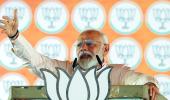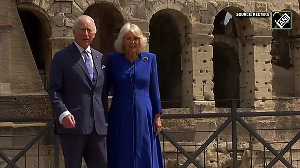In the five years in politics Priyanka Gandhi has undeniably emerged as a thorn in the BJP flesh, notes Nilanjan Mukhopadhyay.
It is time that this thorn is twisted a wee bit more when the elections have become far more uncertain than what it was when the Election Commission announced the poll schedule.

Priyanka Gandhi Vadra formally entered politics more than five years ago in January 2019, after appointment as the general secretary, All India Congress Committee in charge of eastern Uttar Pradesh.
Despite establishing herself as one of the most captivating public speakers in the Congress flock, she has not yet fulfilled her potential.
In a parliamentary democracy like India, political leaders have two terrains to make a mark and be counted in history, either in the parliamentary arena or the organisational space.
Most parties however, follow the tradition of their leaders engaging in the legislative space, as well as the organisational.
Despite her promise, Priyanka Gandhi remains an under-used politician.
Much before formally joining the Congress, she tended to the constituencies of her mother and brother from 2004.
Her role unfortunately, even now remains little but an extension of that.
Although still one of the general secretaries of the party, Priyanka is the only one among the twelve appointed to this position, who does not have a territorial or departmental brief.
When Sonia Gandhi in February chose the Rajya Sabha route to Parliament, it was assumed by most that the vacancy would be filled by her daughter.
Back then, there were mixed views of whether Rahul Gandhi should contest from Amethi or not -- there were pros and cons for either decision. But at no time, was there talk of him contesting from Raebareli.

Priyanka Gandhi is now widely expected to spend considerable time campaigning for her brother besides addressing election rallies in constituencies that the party chooses for her.
She is a forceful speaker with special ability to strike an emotional chord with people.
Her recent speech in Guna, Madhya Pradesh on May 2 is an example of a powerful election speech.
A week prior, Narendra Modi campaigned in the same constituency, where the BJP candidate is former Congress leader Jyotiraditya Scindia.
Separated by days, Modi and Priyanka addressed people from the same constituency.
Thereby, it makes sense to juxtapose their speeches -- what reasons they cited, and how effectively, to convince voters to vote for their party's candidate.
Modi disregarded his party's candidate being a 'dynast', a third generation scion from the erstwhile princely family of Gwalior state who entered politics only because of the premature demise of his father, Madhavrao Scindia, in an aircraft accident.
And, as part of his oft-repeated theme on dynasticism in Indian politics, Modi belittled the principal adversary.
He claimed that for the BJP nothing but the nation mattered, while for the Congress, the family was its sole concern.
Modi ignored that since 2014, the BJP has the largest number of MPs from political families, those preceded by a family member.
The remainder of Modi's speech was a litany of falsehoods. He alleged that:
- The Congress will take away more than half of the earnings of people through inheritance tax.
- The Congress will confiscate people's jewelry and small savings by 'conducting an X-ray' of their properties and valuables.
- The Congress wishes to snatch reservations of SCs/STs/OBCs for the sake of the Muslim vote bank.
- The Congress says Muslims have first right on the country's resources.

In contrast to Modi's shrill falsehoods, Priyanka, undeniably an able challenger, addressed the audience more communicatively.
The progression to core issues of every section of speech was sequential.
She began by acknowledging that the Chambal region, like most places in India, sent a fair number of soldiers to join the armed forces.
This competently foregrounded criticism of the government's decision to replace regular 'permanent' employment in Indian Army with the Agniveer scheme.
Priyanka Gandhi smartly connected this to the problem of unemployment and got the jobless to raise their hands, demonstrating acuteness of the problem.
She rubbed it in that even those who get lucky, and make it through the selection process, would be rendered jobless after four years.
Unlike Modi who did not list reasons why people should vote for the BJP, and instead focused castigating the Congress, Priyanka Gandhi critiqued the Modi government's performance and depicted a catalogue of worrying livelihood concerns, starting with rampant unemployment and crippling inflation.
She smartly juxtaposed poverty and desperation among common people with the comfort and growing riches of select corporates connected with Modi and the ruling party -- she pointed to quid pro quo arrangements in return for donations to BJP through the anonymous electoral bonds route.
She sounded convincing because allegations were specific and not, like Modi, a string of generalities.

Contrasting the two speeches, it is evident that Modi is saddled with the burden of having little new to say, his allegations are old and the recounting the work done has been done once too often.
His speeches are like Films Division documentaries of yore, all old stock and no new footage.
Modi is clearly weighed down by over exposure and even the Goebbelsian technique is showing signs of limitation.
The tour de force in Priyanka Gandhi's speech was her partial breakdown when talking how she received little pieces of her father's body after it was blown up by terrorists.
The assembled crowds clearly empathised with her claim that her father and she, both received martyrdom in legacy and not material inheritance as alleged by Modi.

For the first time, the tables were turned on Modi. Priyanka Gandhi is certainly a better speaker and communicator with the people than her brother, Rahul. Her ease with the Hindi language is evident and she has a charismatic presence.
She has the capacity to be emotional and display anger on the one hand, while being absolutely logical on the other.
Rahul Gandhi on the contrary, is the perpetually angry no-so-young man in politics, someone who either has a scowl on his face or sarcasm on his lips.
Among the two, Priyanka Gandhi is seen as a more 'natural' political personality. But significantly, she plays the secondary role to her sibling and never fails to display love, affection and more importantly, her respect, for him.
With these credentials and capacities where does Priyanka Gandhi go from here?
Despite the worry that the BJP will further drum the presence of three individuals from 'the family' if the Congress party chooses to make her a parliamentarian, she must contest the election and get elected to the Lok Sabha, if only because she will be a articulate parliamentarian with a quick repartee, and a perfect foil to Rahul Gandhi.
It is commonly presumed that in the event of the likely victory of Rahul Gandhi from Wayanad and Raebareli, the bye-election in the seat that he chooses to retain could be used to induct Priyanka Gandhi into the Lok Sabha.
This may be a shade tricky if he resigns from Kerala as then the Congress would have to cope with the pressure to 'return' the seat to a daughter/son of the soil.
After having held her own against Modi, and even going one better, as a speaker in the same constituency, it is time for a gear change in Priyanka Gandhi's political career.
This is turning out to be a more consequential and surprising election and as is proverbially said, one must strike when the rod is hot.

If Priyanka Gandhi is asked by her party (and family) to challenge Modi in his electoral turf from Varanasi, regardless of the result, her career would receive a huge boost and it would also charge up the moribund Congress machinery in eastern Uttar Pradesh.
Certainly, there will be arguments against this proposal, that it is inconceivable to defeat Modi from Varanasi, or for that matter, from any other constituency too at this juncture. But, elections throw up the greatest of surprises; remember Indira Gandhi's defeat to maverick politician, Raj Narain.
Even in defeat, Priyanka Gandhi would have nothing to lose, just as Sushma Swaraj's political stock rose significantly despite her defeat to Sonia Gandhi from Bellary in 1999.
With prior planning, a galaxy of Opposition leaders can be requested to come campaigning, maybe even jointly formally launch Priyanka Gandhi's campaign from Varanasi.
The party, however, will have to take its allies in UP, especially the Samajwadi Party chief, Akhilesh Yadav, into confidence because a possible revival of the Congress can in the long run affect the SP's prospects in the state.
The grapevine has for long been flush with theories of retributive action in the event of Priyanka Gandhi entering the fray.
It is time to either call this bluff or remain completely distanced from the political theatre. After all, there is little purpose in going half-way up the tree.
'Priyanka Gandhi from Varanasi' is certainly an audacious idea, just as Smriti Irani's introduction to the contest in Amethi was in 2019.
In the five years in politics she has undeniably emerged as a thorn in the BJP flesh.
It is time that this thorn is twisted a wee bit more when the elections have become far more uncertain than what it was when the Election Commission announced the poll schedule.
Nilanjan Mukhopadhyay is an author and journalist based in Delhi-NCR. His latest book is The Demolition, The Verdict and The Temple: The Definitive Book on the Ram Mandir Project. He is also the author of Narendra Modi: The Man, The Times.
Feature Presentation: Rajesh Alva/Rediff.com











 © 2025
© 2025